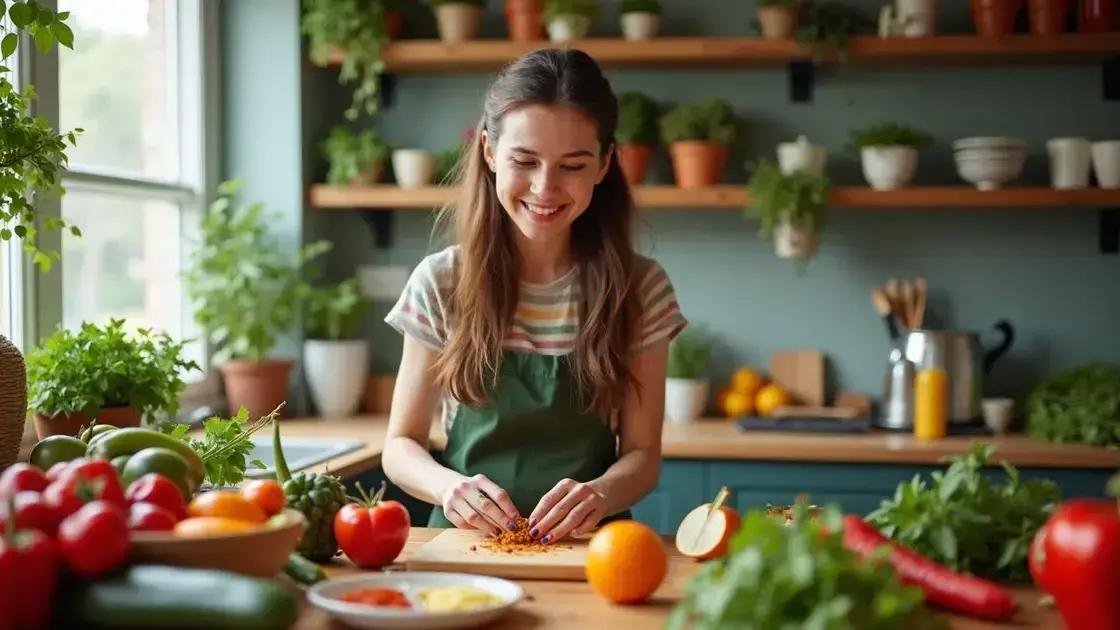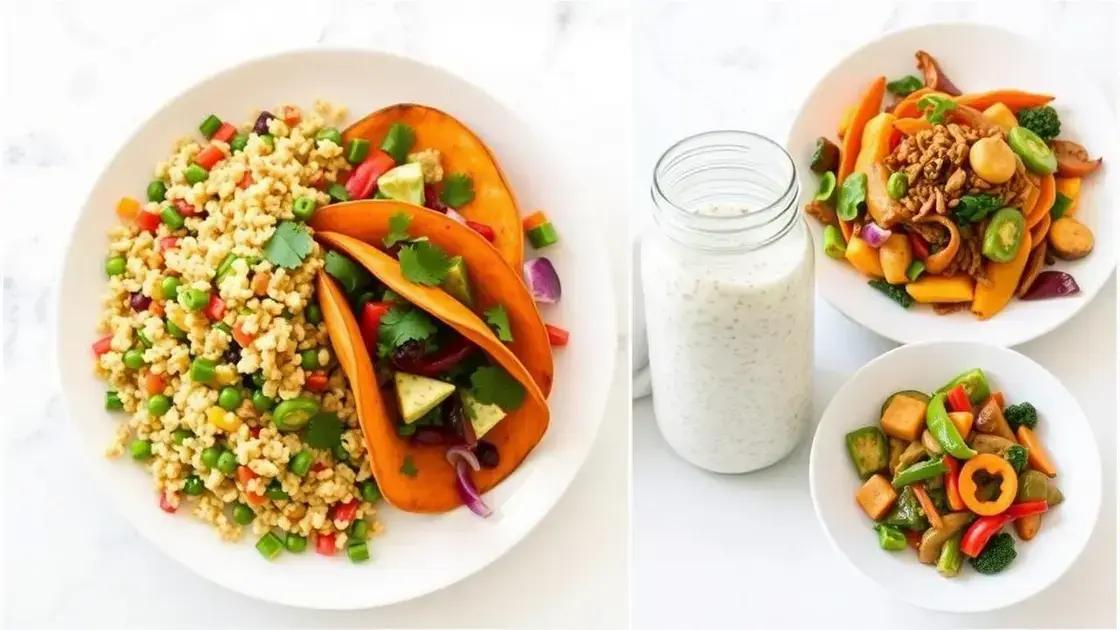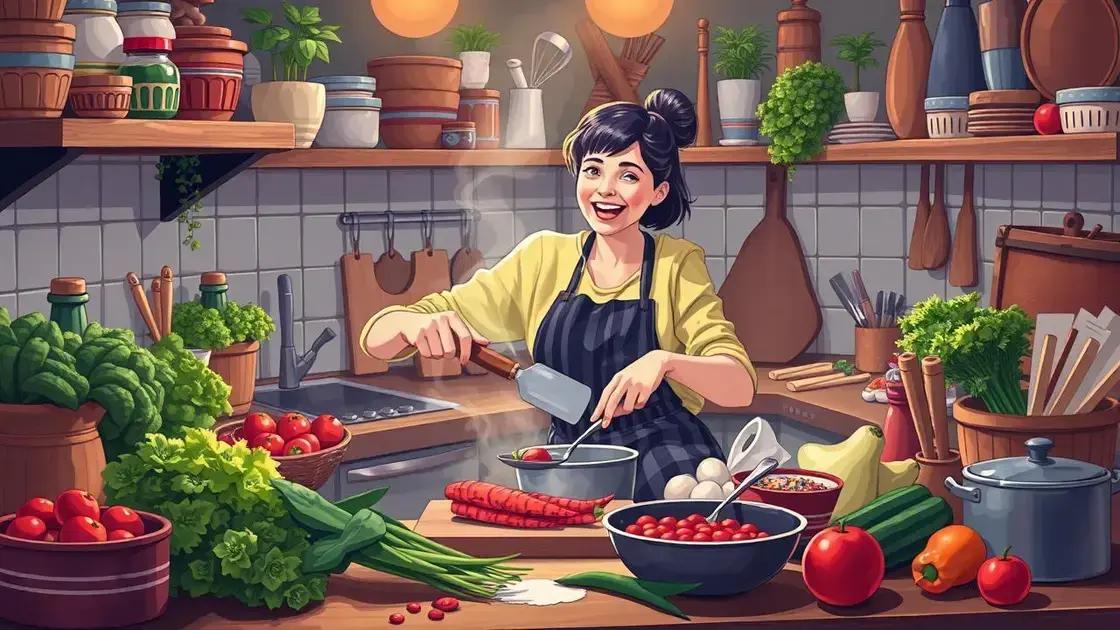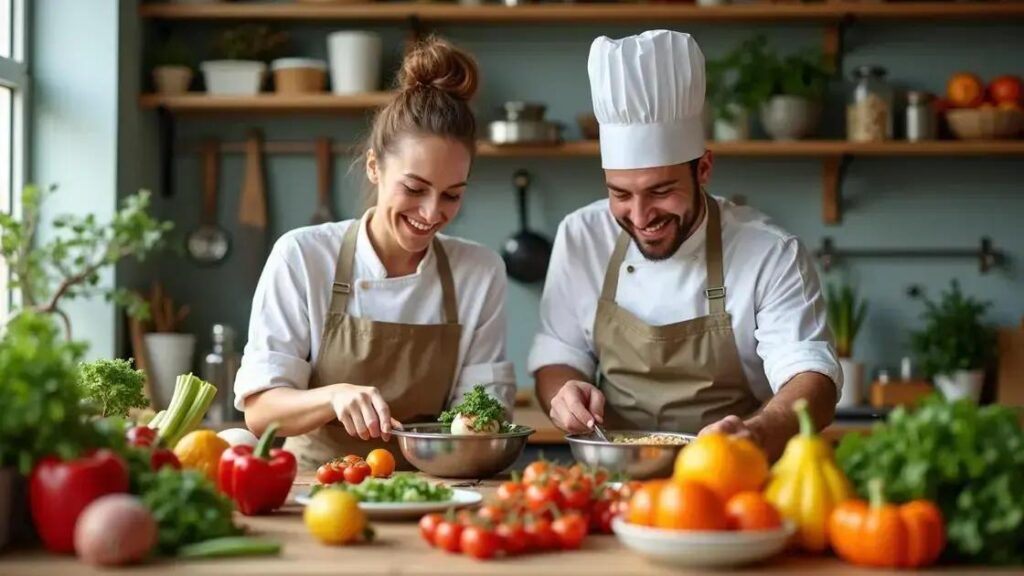Experimenting with new healthy recipes benefits your cooking by introducing variety, enhancing nutrition, and boosting creativity. By trying different ingredients and techniques, you can discover exciting flavors and maintain a balanced diet while making the cooking process enjoyable.
Experimenting with new healthy recipes can transform your cooking experience and overall health. By trying out different ingredients and cooking methods, you not only enhance your culinary skills but also discover a world of flavors that can invigorate your meals. In this article, we’ll delve into why experimentation is crucial to healthy eating, share some exciting recipes, and provide tips to help you succeed in your culinary adventures.
Why Experimentation is Key to Healthy Eating

Experimentation in cooking is essential for maintaining a healthy diet. When you try new ingredients and recipes, you open yourself up to a variety of nutrients that may not be present in your usual meals. This not only supports better health but also keeps your meals exciting and enjoyable.
Discovering New Flavors
One of the main benefits of experimenting is the chance to explore new flavors. Incorporating fruits, vegetables, spices, and herbs you haven’t used before can transform a mundane dish into something remarkable. For instance, adding fresh basil or cilantro can enhance the freshness of a salad, while a sprinkle of paprika can add warmth to a stew.
Staying Motivated and Engaged
Trying new healthy recipes can keep you motivated to stick to your healthy eating goals. When you find joy in cooking and discover delightful dishes, you’re less likely to fall back into unhealthy habits. Regularly bringing variety to your meals combats boredom, which is often a barrier to maintaining a nutritious diet.
Boosting Nutritional Diversity
Cooking different recipes encourages you to include a wide range of foods in your diet. This boosts your nutritional intake, ensuring you get a balance of vitamins, minerals, and antioxidants. For example, substitute white rice with quinoa or cauliflower rice; both are delicious and nutrient-dense alternatives that add variety to meals.
Building Confidence in the Kitchen
Experimenting cultivates confidence in your cooking skills. As you try new recipes, you learn techniques and tips that can improve your overall culinary abilities. More confidence can lead to more adventurous cooking, where you create your own recipes, tailoring them to your preferences and dietary needs.
Top Healthy Recipes to Try

Here are some top healthy recipes to try that can add variety to your meals while promoting a balanced diet.
Quinoa Salad with Lemon Dressing
Ingredients: Cooked quinoa, cherry tomatoes, cucumber, red onion, parsley, lemon juice, olive oil, salt, and pepper.
Instructions: In a large bowl, mix cooked quinoa, chopped vegetables, and parsley. In a smaller bowl, whisk together lemon juice, olive oil, salt, and pepper. Pour the dressing over the salad and toss to combine.
Sweet Potato and Black Bean Tacos
Ingredients: Sweet potatoes, black beans, taco shells, avocado, lime, and spices (cumin, paprika, salt).
Instructions: Roast diced sweet potatoes in the oven with spices until tender. Warm black beans separately. Serve sweet potatoes and beans in taco shells, topped with sliced avocado and a squeeze of lime.
Overnight Oats
Ingredients: Rolled oats, almond milk, yogurt, chia seeds, honey, and favorite fruits (banana, berries).
Instructions: In a jar, mix oats, almond milk, yogurt, chia seeds, and honey. Stir well and let it sit overnight in the fridge. In the morning, add fresh fruits before serving.
Vegetable Stir-Fry
Ingredients: Broccoli, bell peppers, carrots, snap peas, garlic, soy sauce, and sesame oil.
Instructions: Heat sesame oil in a pan. Add minced garlic and stir for a minute. Add vegetables and stir-fry until they’re vibrant and tender. Drizzle with soy sauce before serving.
How Cooking Can Boost Your Creativity

Cooking is a wonderful way to express yourself and can significantly boost your creativity. Experimenting with different ingredients and recipes encourages you to think outside the box.
Endless Possibilities
When you cook, you are faced with countless choices, from flavors to textures. This freedom opens the door for innovation. You may combine unexpected ingredients or create new flavor profiles, leading to unique dishes that reflect your personal style.
Resourcefulness in the Kitchen
Cooking encourages you to be resourceful. You might find yourself using whatever ingredients you have on hand to create a meal. This practice cultivates creativity, as you learn to adapt and improvise, turning an ordinary dish into something extraordinary.
Inspiration from Cultures
Exploring recipes from different cultures can also fuel your creativity. Each cuisine brings its unique ingredients and techniques, inspiring you to try something new. You can mix and match these influences to develop creative fusion dishes that are both delicious and intriguing.
Mindfulness and Relaxation
Cooking can be a mindful practice. The focus required to prepare a meal helps clear your mind, allowing for fresh ideas to emerge. As you chop, mix, and season, you engage your senses, promoting a state of flow that enhances creative thinking.
Tips for Successfully Experimenting in the Kitchen

Successfully experimenting in the kitchen can be fun and rewarding. Here are some tips to help you make the most of your culinary adventures.
Start with What You Know
Begin by using recipes you already enjoy. Try to substitute different ingredients or change cooking techniques. For example, if you love pasta, experiment with different sauces or vegetables.
Make Small Changes First
Don’t feel the need to create a completely new dish in one go. Make small adjustments to existing recipes. For example, try adding a new spice or swapping out a primary ingredient for something healthier.
Keep a Cooking Journal
Document your experiments in a cooking journal. Write down what ingredients you used, what worked, and what didn’t. This will help you keep track of successful recipes and learn from those that did not turn out as planned.
Embrace Mistakes
Understand that not all experiments will be successful, and that’s okay. Embrace mistakes as part of the learning process. Each failure is a chance to improve and discover what doesn’t work.
Invite Friends for a Cooking Night
Cooking with friends can inspire new ideas and encourage you to try unfamiliar ingredients. Make it a fun group activity where everyone contributes to the meal. This not only boosts creativity but also makes cooking a social event!
In Conclusion: Embrace Your Culinary Journey
Exploring new healthy recipes and experimenting in the kitchen can lead to a more fulfilling cooking experience. Each dish offers an opportunity to discover unique flavors, improve your health, and express your creativity.
By trying new ingredients, keeping a cooking journal, and inviting friends to join you, you create a fun and supportive environment for culinary exploration. Remember, the process of learning and experimenting is just as enjoyable as enjoying the delicious meals you create.
Embrace the journey, and let your kitchen be the canvas for your creativity and healthy living.
FAQ – Frequently Asked Questions About Experimenting with Healthy Recipes
Why should I experiment with healthy recipes?
Experimenting with healthy recipes allows you to discover new flavors, improve your cooking skills, and maintain a balanced diet.
What are some easy healthy recipes to start with?
Begin with simple dishes like quinoa salad, sweet potato tacos, overnight oats, and vegetable stir-fry to ease into healthy cooking.
How can cooking boost my creativity?
Cooking encourages you to think outside the box, improvise with ingredients, and explore different culinary cultures, which enhances your creativity.
What tips can I follow for successful kitchen experiments?
Start with familiar recipes, make small changes, keep a cooking journal, embrace mistakes, and cook with friends for inspiration.
How can I encourage others to join me in cooking experiments?
Host cooking nights where friends can contribute and try new recipes together, making it a fun and social experience.
Is it normal for cooking experiments to fail?
Yes, failure is part of the learning process in cooking. Embrace mistakes as opportunities to improve and refine your skills.













